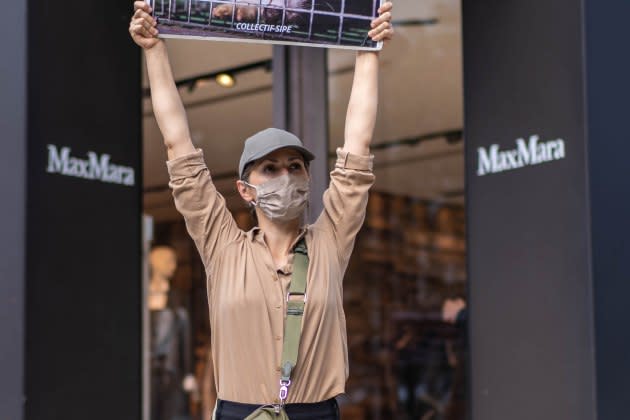Animal Rights Advocates Target Max Mara, Galeries Lafayette in Paris Protests

PARIS — Animal rights group Collectif SIPE is targeting Max Mara’s boutique on Avenue Montaigne as well as Galeries Lafayette’s flagship on Boulevard Haussmann in a series of demonstrations.
They are protesting the continued use of animal fur by the brand’s parent Max Mara Group, the privately held company that also owns Weekend Max Mara, Sportmax, Max & Co. and Marina Rinaldi, among others, as well as discrepancies in Galeries Lafayette’s listing of some of the group’s products.
More from WWD
Max Mara Fetes Ted Bear Coat's 10th Anniversary in Chengdu With Pop-up
Max Mara Revamps Historic Paris Flagship, Launches Creativa Concept in Shanghai
SIPE filed a complaint Tuesday with France’s advertising regulation authority ARPP for false advertising. The filing noted that items listed on Galeries Lafayette’s website described Weekend Max Mara products as having a synthetic “fur effect,” while the label’s website indicates “real asiatic-raccoons fur, fur origin” in the composition of the same items.
It was not immediately clear if the Galeries Lafayette listings were intentionally misleading or an oversight. A spokesperson for Galeries Lafayette corporate division said the company declines to comment on these products.
Berlin-based Zalando had also listed the Weekend Max Mara coats with the description “faux fur.” It removed the items Thursday after being contacted by SIPE. The European shopping site has been part of the “Fur Free Retailer” program since 2016.
“Zalando does not permit animals to be slaughtered solely for the purpose of fashion. We believe that killing animals solely for the purposes of fashion products is unnecessary,” the company states in its policy.
In a statement to WWD, Zalando confirmed it had removed the items.
“If, in exceptional cases, products that contradict our regulations should nevertheless find their way into the Fashion Store, we will immediately take them down and contact the relevant partners,” added a company spokesperson.
SIPE is also asking Max Mara Group to eliminate the use of fur across all brands.
“We are asking them one simple thing — to adopt a fur-free policy,” a SIPE spokesperson told WWD. “We know it is an achievable target. They do not rely on fur [as a core product]. They just have some, and they do not need to rely on the fur industry to survive as a company.”
The SIPE spokesperson noted that Max Mara works with Finland-based Saga furs, which practice factory farming using cages; and auctions fox, mink and raccoon dog fur.
The group said the protests will be ongoing until Max Mara commits to a fur-free policy. “We are using our right to protest, until they decide to get rid of us by getting rid of the fur.”
“Max Mara is trying hard to not have a conversation with us,” the spokesperson added, noting the group had reached out to the company via several channels. “We ask just to have a conversation about our request, or how we can work together toward [a fur-free policy].”
Representatives for Max Mara did not immediately respond to a request for comment.
Adopting a fur-free policy would put Max Mara in line with other luxury houses such as Armani, Burberry, Chanel, Prada, Valentino and Versace, which have stopped selling fur, although it is not a core part of their businesses.
French luxury conglomerate Kering committed to a fur-free policy across all brands including Alexander McQueen, Balenciaga and Gucci, which came into effect with the fall 2022 collections. LVMH Moët Hennessy Louis Vuitton, parent company of Dior and Fendi, continues to use fur.
Retailers in the U.S. including Macy’s, Nordstrom and Saks Fifth Avenue, and Hudson’s Bay in Canada, have adopted fur-free policies. Online retailer Farfetch also banned fur items from its offerings in 2019.
Fur farming has been banned in 19 European countries, 14 of which are EU member states. Strict animal welfare laws in Germany and Switzerland have effectively closed all fur farms in those countries, and Norway’s fur farming ban will come into effect in 2025.
Denmark, Hungary and Sweden have some animal welfare requirements and breed bans in place, but have not outright stopped the practice.
After crossing the 1.5 million signature threshold under the European Citizens Initiative, a petition from Fur Free Europe which calls for a European block-wide ban on farming and killing of animals for fur production, was submitted to the European Commission in June.
Best of WWD
